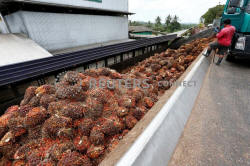Exclusive: EU risks 'trade war' with Malaysia over palm
oil - Mahathir
 Send a link to a friend
Send a link to a friend
 [March 28, 2019]
By A. Ananthalakshmi, Joseph Sipalan and Joe Brock [March 28, 2019]
By A. Ananthalakshmi, Joseph Sipalan and Joe Brock
LANGKAWI (Reuters) - The European Union
risks opening up a trade war with Malaysia over its "grossly unfair"
policies aimed at reducing the use of palm oil, Prime Minister Mahathir
Mohamad said on Thursday.
This month, the European Commission concluded that palm oil cultivation
results in excessive deforestation and its use in transport fuel should
be phased out by 2030.
Malaysia, the world's second biggest palm oil producer after Indonesia,
relies on the crop for billions of dollars in foreign exchange earnings
and hundreds of thousands of jobs.
Mahathir, 93, said the EU's increasingly hostile attitude towards palm
oil, a commodity used in everything from chocolate spread to lipstick,
was an attempt to protect alternatives that Europe produced itself, like
rape seed oil.

"To do that kind of thing to win a trade war is unfair," Mahathir told
Reuters in an interview on Langkawi, a tropical resort island 30 km off
Malaysia's mainland.
"Trade wars are not something we like to promote but on the other hand
it is grossly unfair for rich people to try and impoverish poor people."
Mahathir, an architect of modern Malaysia and a trained physician, swept
to power in a stunning election victory last year on a promise to revive
a flagging economy and end the corruption that plagued the tenure of
former leader Najib Razak.
Najib is facing numerous corruption charges over the alleged misuse of
billions of dollars from Malaysian state fund 1Malaysia Development
Berhad (1MDB), some of which was raised by U.S. investment bank Goldman
Sachs.
Najib is due in court next week in the first trial relating to 1MDB. He
has pleaded not guilty and denies wrongdoing.
Goldman Sachs is facing charges in Kuala Lumpur over its role in helping
raise $6.5 billion for 1MDB. Goldman denies wrongdoing and says
officials under Najib's administration lied to mislead its staff.
'WHEN THE TIME COMES'
Mahathir, who was previously prime minister for 22 years from 1981 to
2003, said Goldman could only do business in Malaysia "if they pay us
what we are asking for", reiterating a figure of $7.5 billion given by
the finance ministry.
[to top of second column] |

A worker unloads palm
oil fruit bunches from a lorry inside a palm oil mill in Bahau,
Negeri Sembilan, Malaysia January 30, 2019. REUTERS/Lai Seng Sin

"Because they were not prudent ... they are supposed to study the borrowers and
lenders properly," he said, adding that he was willing to negotiate with the
bank.
Mahathir said his government was also in talks with the U.S. Department of
Justice over Goldman Sachs.
Goldman Sachs did not immediately respond to a request for comment.
In an effort to reduce Malaysia's debt after the 1MDB scandal, Mahathir is
considering the listing or sale of stakes in state-owned enterprises, including
Malaysia Airlines.
There has been speculation this could include selling a portion of Petronas,
Malaysia's national energy behemoth and the world's third-biggest exporter of
liquefied natural gas.
But Mahathir said this was not on the cards.
"It has always even given the government good returns. We have no plans to
privatize or to sell Petronas," he said.
There is daily speculation in Malaysia about when Mahathir, who is well into his
nineties, will hand over power to one-time foe and former deputy prime minister,
Anwar Ibrahim.
Mahathir, whose five-year term would end in 2023, had originally promised to
cede control to Anwar in 2020.

"I will step down when the time comes ... but we have not fixed a date," he
said.
"I promised I will not go up to five years. I stand by my promise."
(Reporting by A. Ananthalakshmi, Joseph Sipalan and Joe Brock; Editing by Robert
Birsel)
[© 2019 Thomson Reuters. All rights
reserved.] Copyright 2019 Reuters. All rights reserved. This material may not be published,
broadcast, rewritten or redistributed.
Thompson Reuters is solely responsible for this content. |